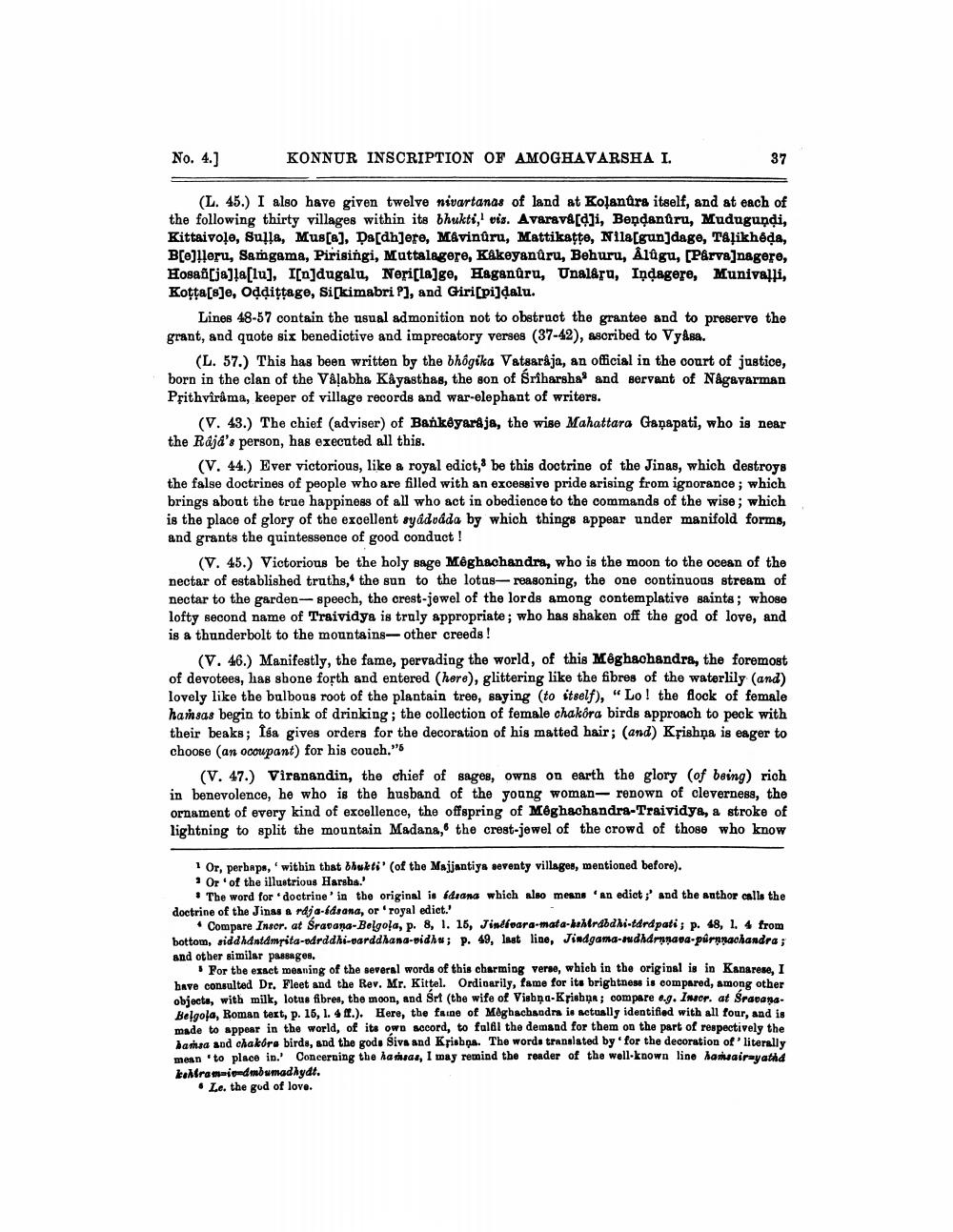________________
No. 4.]
KONNUR INSCRIPTION OF AMOGHAVARSHA I.
37
(L. 45.) I also have given twelve nivartanas of land at Kolantra itself, and at each of the following thirty villages within its bhukti, vis. Avarava[ali, Bendantru, Mudugundi, Kittaivole, Sulla, Mus[], Da[dh]ere, Møvingru, Mattikatte, Nila[gun]dage, Taļikheda, B[e]lleru, Samgama, Pirisingi, Muttalegere, Kakeyanúru, Behuru, Ålügu, [Pârva]nagere, Hosañ[ja]la[lu], [[n]dugalu, Neri[la]ge, Haganúru, Unalaru, Indagere, Munivalli, Kotta[8]e, Oddittage, Si[kimabri P], and Giri[pi]dalu.
Lines 48-57 contain the usual admonition not to obstruct the grantee and to preserve the grant, and quote six benedictive and imprecatory verses (37-42), ascribed to Vyasa.
(L. 57.) This has been written by the bhôgika Vatsarája, an official in the court of justice. born in the clan of the Valabha Kayasthas, the son of Sribarsha and servant of Någavarman Prithvirâma, keeper of village records and war-elephant of writers.
(V. 43.) The chief (adviser) of Bankhyaraja, the wise Mahattara Ganapati, who is near the Raja's person, has executed all this.
(V. 44.) Ever victorious, like a royal edict, be this doctrine of the Jinas, which destroys the false doctrines of people who are filled with an excessive pride arising from ignorance ; which brings about the true happiness of all who act in obedience to the commands of the wise, which is the place of glory of the excellent syddodda by which things appear under manifold forms, and grants the quintessence of good conduct !
(V. 45.) Victorious be the holy sage Meghachandra, who is the moon to the ocean of the nectar of established truths, the sun to the lotus- reasoning, the one continuous stream of nectar to the garden-speech, the crest-jewel of the lords among contemplative saints; whose lofty second name of Traividya is truly appropriate; who has shaken off the god of love, and is a thunderbolt to the mountains- other creeds!
(V. 46.) Manifestly, the fame, pervading the world, of this Méghachandra, the foremost of devotees, has shone forth and entered (here), glittering like the fibres of the waterlily (and) lovely like the balbous root of the plantain tree, saying (to stself), “Lo! the flock of female hansas begin to think of drinking; the collection of female chakôra birds approach to peck with their beaks; Isa gives orders for the decoration of his matted hair; (and) Křishna is eager to choose (an ocoupant) for his couch."
TV 47 Viranandin, the chief of sages, owns on earth the glory (of being) rich in benevolence, he who is the husband of the young woman-renown of cleverness, the ornament of every kind of excellence, the offspring of Meghachandra-Traividya, a stroke of lightning to split the mountain Madana, the crest-jewel of the crowd of those who know
Or, perbapa,' within that bhakti' (of the Majjantiya seventy villages, mentioned before). ? Or of the illustrious Harsha.
• The word for doctrine' in the original is fdsana which also means 'an edict;' and the author calls the doctrine of the Jinas & rdja-ldsana, or royal edict.'
• Compare Insor. at Sravana-Bolgola, p. 8, 1. 15, Jindi vara-mata-hshirdodhi-tard pati; p. 48, 1. 4 from bottom, siddhantamrita-edrddhi-varddhana-vidh*; p. 49, last line, Jindgama-udhdranasa-parunachandra and other similar passages.
For the exact meaning of the several words of this charming verse, which in the original is in Kanarese, I have consulted Dr. Fleet and the Rev. Mr. Kittel. Ordinarily, fame for its brightness is compared, among other objects, with milk, lotus fibres, the moon, and Srt (the wife of Visbņa-Krishna; compare e.g. Inor. at SravanaBelgola, Roman text, p. 16, 1. 4 ff.). Here, the fate of Meghachaodra is actually identified with all four, and is made to appear in the world, of its own accord, to fulfil the demand for them on the part of respectively the
hamhna and chakra birds, and the gods Siva and Krisboa. The words translated by for the decoration of literally mean to place in Concerning the hansaa, I may remind the reader of the well-known line hashairayatid konfransiedmbumadhydt.
• Le. the god of love.




